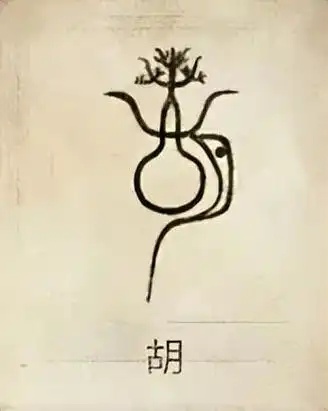The Hu(hú) surname is one of the oldest and most culturally rich surnames in China, reflecting the diversity and inclusiveness of Chinese civilization. With origins spanning over 4,000 years, the Hu surname has played a significant role in shaping China’s history, culture, and society. Let’s explore the story of the Hu surname, from its ancient beginnings to its modern significance.

Ⅰ、Origins of the Hu Surname:
1. From Honorific Titles to Surnames
The Hu surname’s primary origin traces back to the descendants of Emperor Shun, a legendary ruler in ancient China. During the early Western Zhou Dynasty (1046–771 BCE), Gui Man, a 33rd-generation descendant of Emperor Shun, was granted the territory of Chen (modern-day Huaiyang, Henan) for his virtue. He was posthumously honored with the title "Hu Gong", and his descendants adopted "Hu" as their surname. This lineage forms the core origin of the Hu surname.
2. From Ancient States to Surnames
The Ji-Surnamed Hu State:
A vassal state of the Western Zhou Dynasty located in modern-day Luohe, Henan, it was annexed by the State of Zheng in 763 BCE, and its descendants took "Hu" as their surname.
The Gui-Surnamed Hu State:
Established by the Gui Yi tribe during the Shang and Zhou Dynasties in modern-day Fuyang, Anhui, this state was known for producing fine arrow shafts. After its annexation by the State of Chu, its people adopted the Hu surname.
3. Official Titles and Ethnic Integration
Hu Shi and Huqi Commandant: During the Zhou Dynasty, "Hu Shi" managed royal ceremonies and feasts, while the Han Dynasty’s "Huqi Commandant" led foreign cavalry units. Descendants of these officials adopted "Hu" as their surname.
Ethnic Assimilation: The Hu surname also emerged from ethnic groups such as the Xianbei, Jurchen, and Manchu peoples during periods of cultural integration. Additionally, the "Mingjing Hu Clan" originated from Tang Dynasty imperial descendants who changed their surname to Hu to avoid persecution.
Ⅱ、Historical Figures:
1. Political and Military Leaders
Hu Fen: A prominent general during the Western Jin Dynasty, his daughter became a concubine of Emperor Wu, securing the family’s influence for centuries.
Hu Zongxian: A Ming Dynasty general who led efforts to combat Japanese pirates, authoring the foundational text on coastal defense, Chou Hai Tu Bian.
Hu Linyi: A key figure in the late Qing Dynasty’s Xiang Army, he worked alongside Zeng Guofan to modernize China’s military and promote the Self-Strengthening Movement.
Hu Hanmin: A revolutionary leader and close associate of Sun Yat-sen, he played a pivotal role in establishing the Republic of China.
2. Thinkers and Cultural Icons
Hu An: A Han Dynasty educator and mentor to the famous poet Sima Xiangru, Hu An pioneered private education in China.
Hu Anguo: A Song Dynasty Confucian scholar who founded the Huxiang School, his work Commentary on the Spring and Autumn Annals became a key text for imperial examinations.
Hu Yuan: A pioneer of Neo-Confucianism during the Northern Song Dynasty, he emphasized practical learning and laid the foundation for Chinese academy education.
Hu Gongshou: A Qing Dynasty painter who blended literati and folk art styles, his masterpiece Fragrance Fills the Lotus Pond remains a cultural treasure.
Hu Shi: A leading figure in the New Culture Movement, Hu Shi championed vernacular Chinese and authored Outline of the History of Chinese Philosophy, revolutionizing modern scholarship.
3. Business Legends
Hu Xueyan: A late Qing Dynasty merchant and philanthropist, Hu Xueyan founded the renowned Hu Qing Yu Tang pharmacy and became a symbol of entrepreneurial success and ethical business practices.
Ⅲ、Cultural Significance:
1. Ancestral Halls and Family Values
Purple Hall: Named after a legend about a withering purple jasmine tree, this ancestral hall symbolizes family unity and harmony.
Mingjing Hu Clan: Descended from Tang Dynasty royalty, this branch of the Hu family is known for its emphasis on scholarship over political ambition.
2. Genealogical Records and Cultural Heritage
The Hu Clan Genealogy and Yuanhe Surname Compendium document the Hu surname’s migration and development, while Hu Shi’s works remain foundational texts in modern Chinese philosophy and literature.
Ⅳ、Social Impact:
1. Migration and Distribution
Ancient Migration: The Hu surname originated in Henan and spread westward to Gansu during the Qin and Han Dynasties. Following the Yongjia Disturbance (311 CE), the Hu clan migrated south to Fujian and later across China during the Ming and Qing Dynasties.
Modern Distribution: With a population of approximately 17.23 million, the Hu surname is concentrated in Hubei, Hunan, and Sichuan, with significant overseas communities.
2. Economic and Cultural Contributions
Commerce: Hu Xueyan’s financial acumen and Hu Kaiwen’s ink-making industry exemplify the Hu clan’s entrepreneurial spirit.
Science and Arts: Modern figures like aerospace scientist Hu Haichang and film director King Hu continue the Hu surname’s legacy of innovation and creativity.
Conclusion:
The 4,000-year history of the Hu surname is a microcosm of Chinese civilization—from the legendary Emperor Shun to the intellectual ferment of the New Culture Movement, from ancient migrations to modern achievements. Whether through Hu Yuan’s educational reforms, Hu Shi’s literary revolution, or Hu Xueyan’s business acumen, the Hu surname has consistently contributed to the shaping of Chinese culture. Today, the Hu surname stands as a testament to the enduring spirit of resilience, innovation, and unity.